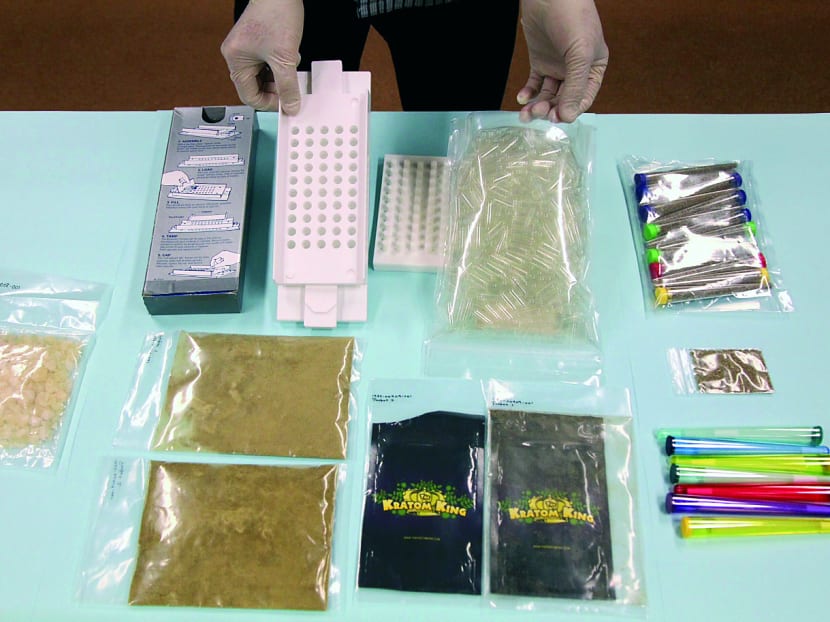New psychoactive drugs to become illegal in S’pore
SINGAPORE — The authorities have moved to reclassify a list of so-called “legal highs” — which mimic the effects of drugs such as cocaine and Ecstasy — as Class A controlled drugs, making the abuse of such substances an offence punishable by imprisonment and caning.

Central Narcotics Bureau Singapore introduces ban on new controlled substances, 30 Apr 2014. Photo: Don Wong
SINGAPORE — The authorities have moved to reclassify a list of so-called “legal highs” — which mimic the effects of drugs such as cocaine and Ecstasy — as Class A controlled drugs, making the abuse of such substances an offence punishable by imprisonment and caning.
Known as New Psychoactive Substances (NPS), they are mainly produced by introducing slight modifications to the chemical structures of controlled drugs. They were listed in the Fifth Schedule of the Misuse of Drugs Act enacted last year, which allows the authorities to seize them, but the trafficking, manufacture, import, export, possession or consumption of them did not constitute an offence.
With the reclassification, anyone found guilty of trafficking any NPS will face at least five years in jail and five strokes of the cane. A person found abusing any NPS can be jailed for up to 10 years, fined up to $20,000, or both.
The change takes effect today. Announcing the move, the Central Narcotics Bureau (CNB) said that, globally, there has been an increase in the number of cases of NPS trafficking and abuse in the past year. A CNB spokesperson said that between May 1 last year and the end of February this year, it had seized such substances on at least 30 occasions.
“Thus far, synthetic cannabinoids and synthetic cathinones are the two more commonly detected NPS,” the spokesperson said.
Such substances have been linked to adverse physical and psychological reactions, including paranoia, seizures, hallucinations and even death. “Given these developments and the fact that these substances mimic the effects of harmful Class A drugs, CNB has decided to list all the Fifth Schedule drugs to the First Schedule of the Misuse of Drugs Act as Class A controlled drugs,” the CNB said.
It added that consultations with the Health Sciences Authority, research institutes and industry stakeholders have found that there are currently no known medical and industrial uses for these substances.
In its World Drug Report 2013, the United Nations Office on Drugs and Crime called NPS an “alarming new drug problem”. Much of these drugs are legal and are marketed as “legal highs”, “research chemicals”, “plant food” and “bath salts”. The report said the number of such substances is growing steadily at the global level, jumping from 251 in 2012 to 348 last year.
The Fifth Schedule was enacted last year to list these substances temporarily. As time is needed to study a drug before it can be made illegal, the temporary listing of a substance on the Fifth Schedule allowed the authorities to seize it so its circulation could be restricted.
The announcement yesterday marked the first time Fifth Schedule-listed substances were reclassified as controlled drugs.
In a statement, CNB Director Ng Ser Song said: “The drug situation is challenging and the number of repeat drug abusers and young drug abusers remains a concern. With the abuse and trafficking of NPS on the rise, listing these new psychoactive substances as Class A controlled drugs signals our unequivocal stance that these substances are illegal and no different from other controlled drugs.”









